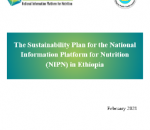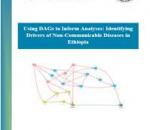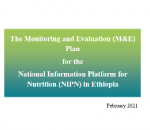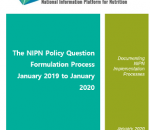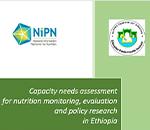NIPN Project Documents
The National Information Platform for Nutrition (NIPN) is a global initiative launched by the European Commission to support Scaling up Nutrition countries that have a high malnutrition burden. It supports the generation of evidence that is used by nutrition stakeholders to develop policy, design programs and to allocate investments. The NIPN initiative is currently implemented in nine countries around the world.
The National Information Platform for Nutrition (NIPN) is a global initiative launched by the European Commission to support Scaling Up Nutrition countries that have a high malnutrition burden. It supports the generation of evidence that is used by nutrition stakeholders to develop policy, design programs and to allocate investments
This plan is prepared as a road map to guide the continuity of NIPN beyond the project period and ensure long-lasting impact in the nutrition sector. The specific objectives of the plan describe the NIPN’s interventions and specific actions which foster sustainability, the future plans for the sustained use of the NIPN and its services, and the NIPN’s fundraising plan to diversify its funding portfolio.
To respond to one of the research questions (What are the drivers of NCDs i.e., overweight/obesity, hypertension, and diabetes in Ethiopia?), NIPN embarked on a new approach for data analysis. The approach uses causal path diagrams otherwise known as ‘directed acyclic graphs’ (DAGs) which have been constructed as part of the methodological framework underpinning the analysis.
This NIPN M&E Plan forms part of the implementation and project management of the NIPN. It describes the NIPN’s results framework, its intervention logic and theory of change, the M&E processes, the team, the data quality, and flow, data sources, collection, management, analysis, and reporting. It also provides an overview of the M&E matrix with indicators, targets, and means of verification.
As part of the NIPN project cycle a policy question formulation (PQF) process takes place to help government ministries and the NIPN identify key nutrition policy questions which need to be answered to inform policy revisions, strategy development and program implementation. The initial PQF process was elaborate; it included literature reviews, interviews with key stakeholders and several consultative meetings.
As part of the implementation of the NIPN operational cycle in Ethiopia, a set of priority policy questions were identified in 2019. Responses to most of these policy questions will be based on analysis of existing data, but a rapid literature review will help to refine the policy questions and provide useful information to guide the analysis.
EPHI and IFPRI jointly conducted a NIPN Capacity Needs Assessment (NIPN CNA) to identify capacity needs and recommend strategies to strengthen capacities for nutrition monitoring, evaluation, policy research, data and knowledge sharing.
NIPN-Ethiopia finalized its communication strategy aiming to bridge effective communication among the stakeholders,


